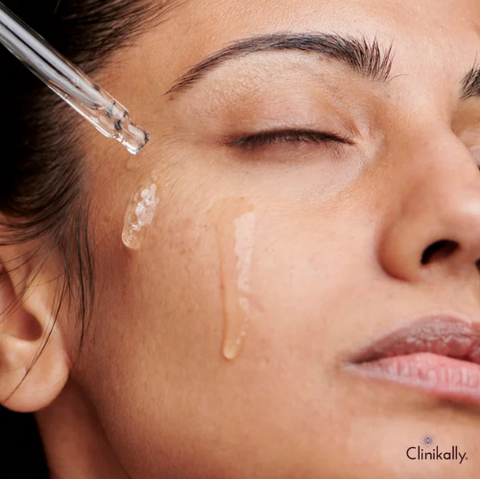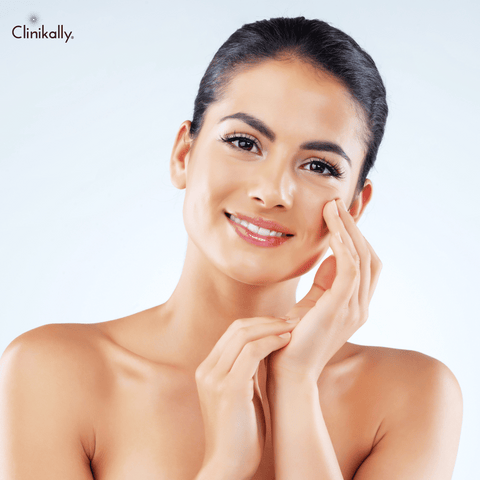Using BHA and Vitamin C in your skincare regimen can help you get better-looking skin. Salicylic acid, also known as beta hydroxy acid (BHA), is a chemical exfoliator that may get deep inside the pores to clear them out and get rid of dead skin cells. For skin types that are oily and acne-prone, it works particularly well. Ascorbic acid, another name for vitamin C, is a potent antioxidant that can promote the formation of collagen, lighten skin tone, and diminish hyperpigmentation. Combining BHA with Vitamin C can benefit the skin in a positive way. Vitamin C can act more effectively and penetrate the skin deeper when BHA helps exfoliate the face and clear clogged pores. Contrarily, vitamin C can help calm the skin and lessen irritation brought on by BHA. You can get the best benefits for clearer, brighter, and healthier-looking skin by combining BHA and Vitamin C in your skincare routine. To protect your skin, keep in mind to start off slowly, use gentle products, and apply sunscreen frequently.
Understanding BHA and Vitamin C

Two well-liked skincare compounds that can help improve the appearance of your skin are beta hydroxy acid (BHA) and vitamin C. Let's examine each component in more detail:
-
Beta Hydroxy Acid (BHA): Salicylic acid, sometimes referred to as BHA, is a chemical exfoliant that may get deep inside the pores to clear them out and remove dead skin cells. For skin types that are oily and acne-prone, it works particularly well. BHA is beneficial in treating and preventing acne because it is oil-soluble, which allows it to pass through the oil and sebum in the skin. Anti-inflammatory effects of BHA are also proven to help lessen irritation and redness.
-
Vitamin C: Ascorbic acid, another name for vitamin C, is a potent antioxidant that has the ability to lighten skin tone, lessen hyperpigmentation, and increase collagen formation. It is efficient at shielding the skin from free radicals brought on by UV radiation, pollution, and other variables in the environment that might harm the skin. Moreover, vitamin C contains anti-inflammatory qualities that can help relax and soothe the skin.
BHA and vitamin C combined may benefit the skin in a synergistic way. Vitamin C can act more effectively and penetrate the skin deeper when BHA helps exfoliate the face and clear clogged pores. Contrarily, vitamin C can help calm the skin and lessen irritation brought on by BHA. BHA and vitamin C can make your skin look better if you include them in your skincare regimen. These components have the potential to increase your skin's sensitivity to the sun, so it's critical to apply a broad-spectrum sunscreen with an SPF of at least 30 to protect your skin during the day. Use one component at a time to begin with if you have sensitive skin, and then add the other ingredient gradually to see how your skin responds.
BHA: A Powerhouse Exfoliator for Clearer Skin
Salicylic acid, commonly known as beta hydroxy acid (BHA), is a potent exfoliant that can aid in clearing the face and preventing acne. This is how it goes:
BHA can pass through the skin's oil and sebum because it is oil-soluble. As a result, treating and preventing acne is highly effective. BHA may get deep inside the pores and exfoliate the pore walls, which helps to clear them out and stop fresh acne from developing. BHA can aid in minimising the appearance of blackheads and whiteheads by clearing the pores of dead skin cells and extra sebum. BHA contains anti-inflammatory qualities in addition to its exfoliating ones. This is an excellent option for people with sensitive skin or acne-prone skin because it can help minimise the redness and inflammation brought on by acne.
It's crucial to start gradually and apply BHA in accordance with instructions when introducing it into your skincare routine. It's crucial to carefully follow the guidelines because misuse might result in dryness and irritation. Also, since BHA might make your skin more susceptible to the sun, it's crucial to wear sunscreen during the day. BHA is a potent exfoliant that can help skin that is prone to acne clear up and look better. It's an excellent option for people with oily, acne-prone skin or those who want to make their pores look better.
Vitamin C: An Essential Antioxidant for Glowing Skin
Strong antioxidants like vitamin C are necessary for preserving healthy, radiant skin. The following are some ways that vitamin C helps the skin:
-
Brightens the skin: Vitamin C is renowned for its capacity to lighten hyperpigmentation and brighten the skin. The skin may appear more radiant by helping to lighten dark spots and even out skin tone.
-
Stimulates collagen production: The synthesis of collagen, which is necessary for maintaining healthy, youthful-looking skin, depends on vitamin C. The protein collagen gives the skin its suppleness and aids in minimising the appearance of wrinkles and fine lines.
-
Protects against environmental stressors: As a potent antioxidant, vitamin C helps to shield the skin from free radicals, and unstable molecules that can harm the skin and speed up the ageing process. Vitamin C assists in defending the skin against environmental stressors like UV radiation and pollution by scavenging free radicals.
-
Improves skin texture: Vitamin C can also help to improve the texture of the skin. It can help to soften and smooth rough, dry skin, giving it a more youthful, healthy appearance.
Antioxidants like vitamin C are crucial for preserving healthy, radiant skin. It can help defend against environmental stresses, enhance skin texture, and brighten the skin. It can also aid in promoting collagen development. To keep your skin looking its best, it's crucial to include vitamin C in your skincare regimen.
Can You Mix BHA with Vitamin C?

Absolutely, you can combine BHA and vitamin C in your skincare routine. In fact, they can work in unison to help the skin in a variety of ways. Salicylic acid, often known as BHA, is an oil-soluble exfoliator that gets deep inside the pores to clear them out and stop acne. Moreover, it might aid in reducing the visibility of whiteheads and blackheads. On the other hand, vitamin C is a potent antioxidant that brightens the skin and promotes the creation of collagen. Combining BHA and vitamin C can help exfoliate the skin, brighten the complexion, and defend against free radical damage. To prevent any potential reaction or irritation, it's crucial to use these components properly. Start by combining BHA and vitamin C in the morning and at night, respectively. This will enable the skin to absorb each ingredient completely without becoming overstimulated. Also, it's crucial to patch-test new items and gradually introduce them to prevent any potential reaction or irritation. If you have sensitive skin, you might want to start with a lower BHA and vitamin C concentration and then gradually raise it as your skin becomes used to the chemicals. Use a moisturiser and sunscreen throughout the day to shield the skin from further harm and keep it hydrated.
Assessing Ingredient Compatibility
Building an efficient skincare routine requires taking the compatibility of the ingredients into account. When deciding whether or not ingredients are compatible, keep the following things in mind:
-
Compatibility with pH: Some ingredients used in skincare perform best at a specific pH level. For instance, vitamin C and retinol perform better at higher pH levels than AHAs and BHAs do at lower pH levels. It's crucial to use products with different pH levels in the right order if you want to avoid upsetting the skin's pH balance.
-
Active ingredient compatibility: Certain active substances may interact with one another and irritate or sensitise people. As an illustration, mixing retinol and AHAs can raise the danger of skin irritability. Before combining active chemicals, make sure you do your homework and understand any possible interactions.
-
Sensitivity: Some people may be more sensitive than others to particular ingredients. Patch testing new products and introducing them gradually is crucial if you have sensitive skin in order to prevent irritation or sensitivity.
-
Formulation: A product's formulation may have an effect on how well it works with other goods. For instance, water-based goods might not work well with oil-based products. Your skincare products should be used in the proper sequence and with attention to the formulation.
By taking these elements into account, you can establish which substances work well together and create a skincare program that effectively treats the issues with your particular skin. Consult a dermatologist or skincare expert for tailored advice if you're unclear about how to combine specific substances.
Benefits of Combining BHA and Vitamin C
Using BHA and vitamin C in your skincare regimen can improve your skin in a variety of ways. The following are some advantages of mixing these components:
-
Exfoliation: Salicylic acid, also known as BHA, is an oil-soluble exfoliant that gets deep inside the pores to clear them out and stop acne. The exfoliating qualities of vitamin C can also help to improve the texture of the skin and brighten the complexion. A powerful exfoliating effect for clearer, smoother skin can be achieved by combining these ingredients.
-
Brightening: Vitamin C is an effective antioxidant that can lighten skin tone and lessen the appearance of dark spots and hyperpigmentation. It can give skin an additional boost of brightness and aid in skin tone equilibration when combined with BHA.
-
Collagen production: The creation of collagen, which keeps the skin tight and youthful, depends on vitamin C. When used with BHA, it can aid in enhancing the skin's general texture and minimising the visibility of wrinkles and fine lines.
-
Antioxidant protection: BHA and vitamin C both offer the skin antioxidant defence, assisting in preventing oxidative stress and free radical damage. Combining these substances can offer a potent barrier against early ageing and other skin issues.
It's crucial to remember that combining BHA with vitamin C can irritate certain people, particularly those with sensitive skin. It's crucial to introduce new ingredients gradually and patch-test new products before using them on your entire face if you have sensitive skin or are new to utilising certain ingredients.
How to Incorporate Both Ingredients into Your Skincare Routine
To prevent upsetting the skin's pH balance, it's crucial to apply BHA and vitamin C in the right order when incorporating them into your skincare routine. Here is a quick exercise that uses both of the ingredients:
-
Cleanse: To remove dirt, oil, and makeup, start by gently cleansing your skin.
-
BHA: Use your BHA product on dry, clean skin. If you've never used BHA before, start out by taking it once or twice a week and work your way up to taking it every day if tolerated.
-
Toner: Follow up with a hydrating toner to balance your skin's pH and prepare it for the next steps.
-
Vitamin C: After your toner has been absorbed, use your vitamin C product. You can use vitamin C in the morning or the evening, but it's important to wear sunscreen during the day as it can make your skin more sensitive to the sun.
-
Moisturise: Finish off your routine with a moisturiser to hydrate and nourish your skin. You can also add an eye cream or serum if desired.
It's important to choose high-quality products that are tailored to your skin type and issues because not all BHA and vitamin C products are created equally. See a dermatologist or other skincare expert for individualised advice if you're unclear about which products to use or how to incorporate them into your routine.
Tips for Using BHA and Vitamin C Safely and Effectively

Here are some guidelines for using vitamin C and BHA safely and effectively:
-
Start out slowly: If you've never used vitamin C or BHA before, start by taking them once or twice per week. Then, as tolerated, gradually increase the frequency. This will reduce the likelihood of irritation and give your skin time to adjust to the ingredients.
-
Patch test: Before using BHA or vitamin C on your entire face, test a small area of skin first to see if there are any negative reactions.
-
Pick high-quality products: Look for vitamin C and BHA formulations that are appropriate for your skin type and concerns. A high concentration of active ingredients and pH-balanced products should be used.
-
Use sunscreen: Sunscreen should be worn during the day to protect your skin from UV rays since BHA and vitamin C can make your skin more sensitive to the sun.
-
Avoid combining with other active ingredients: Using BHA and vitamin C together with other active ingredients like retinol or alpha hydroxy acids can cause irritation. It's best to use these ingredients separately, or for more specific guidance, speak with a dermatologist or skincare expert.
-
Follow instructions: Always heed the advice of your skincare specialist or the instructions on the product label. Vitamin C or BHA overuse or abuse may result in skin irritation or other negative effects.
-
Listen to your skin: Stop using the product and seek advice from a dermatologist or other skincare expert on how to modify your routine if you notice any redness, itching, or other symptoms of irritation.
Identifying Your Skin Type and Concerns
The first step in creating an efficient skincare routine is determining your skin type and issues. These are some typical skin issues and types:
-
Dry skin: You may have dry skin if it feels tight or flaking. Environment, ageing, and heredity all have an impact on dry skin.
-
Oily skin: If your skin feels greasy and looks shiny, you may have oily skin. Genetics, hormonal changes, or excess production of sebum can all contribute to oily skin.
-
Combination skin: You might have combination skin if certain areas of your face are both dry and oily. Hormonal changes, environmental factors, or genetics can all contribute to combination skin.
-
Acne-prone skin: You may have skin that is prone to acne if you experience regular outbreaks or pimples. Hormonal changes, genetics, or environmental factors can all contribute to acne.
-
Sensitive skin: You might have sensitive skin if it becomes easily irritated, itchy, or red. Genetics, environmental factors, or the use of abrasive skincare products can all contribute to sensitive skin.
Once you've determined your skin type, you can select skincare items that are designed to address your particular problems. For instance, you might want to select a moisturising cleanser and a hydrating moisturiser if you have dry skin. Choose products with salicylic acid or benzoyl peroxide if your skin is prone to breakouts or you have oily skin. Use soft, fragrance-free products that are designed for sensitive skin if you have sensitive skin.
Introducing Ingredients Gradually
It's crucial to incorporate new skincare components gradually into your routine. This lessens the possibility of sensitivity or irritation while also assisting your skin in adjusting to the new items. Here are some pointers for incorporating novel skincare ingredients:
-
Start with one product at a time: Introduce one new product at a time and wait at least a week before introducing another. This allows your skin to adjust to the new product and helps you determine if it's working for your skin.
-
Patch test: Test a new product on a small patch of skin before using it all over your face. This can assist you in figuring out which ingredients you may be allergic or sensitive to.
-
Use little amounts: When introducing a new product, use a little bit at first and build up the amount gradually over time. This can lessen the likelihood of irritation and assist your skin in adjusting to the new product.
-
Don't use too many new products at once: Introducing too many new products at once can overload your skin and increase the risk of irritation. Stick to one new product at a time.
-
Be patient: It may take a few weeks before you fully appreciate the advantages of a new product. Give a product time to work for your skin before giving up on it.
You can help your skin adapt to new skincare ingredients and lower the likelihood of sensitivity or irritation by introducing new ingredients gradually.
Balancing Active Ingredients with Hydration and Skin Barrier Care
To maintain healthy, radiant skin, it's crucial to strike a balance between the use of active skincare products, hydration, and skin barrier maintenance. Here are a few pieces of advice:
-
Use a gentle cleanser: A gentle cleanser that won't remove your skin's natural oils is what you should pick. Steer clear of harsh substances like sulphates, which can irritate and dry up the skin.
-
Use a moisturiser: Keeping skin healthy requires regular moisturising. Look for a moisturiser that is hydrating and contains components like ceramides and hyaluronic acid, which help to strengthen the skin barrier and lock in moisture.
-
Add hydration: As an alternative to moisturising, think about hydrating your routine by using a hydrating toner or essence. These goods can aid in moisturising the skin and enhancing other skincare products' absorption.
-
Use sunscreen: Shield your skin from UV rays by donning a broad-spectrum sunscreen with a minimum SPF of 30 every day.
-
Don't overdo it with active ingredients: Despite the potential benefits of active skincare products like BHAs and Vitamin C, moderation is key. The skin barrier can be compromised by over-exfoliation or irritation, which can result in dryness and sensitivity.
-
Listen to your skin: Take attention to how various products make your skin feel and modify your routine as necessary. Reduce the number of active ingredients and concentrate on hydration and skin barrier care if you experience dryness or irritation.
You can contribute to maintaining healthy, radiant skin by balancing the use of active skincare products with hydration and skin barrier maintenance.









































